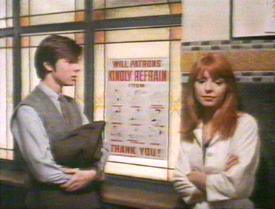 Why is unrequited love (or lust) such a common theme in movies? Maybe it's because no medium is better suited--cinema is unrequited love. It's like looking at the whole world through binoculars: it's easier to fall in love with someone who could never love you back, or with a complete and distanced stranger. It's a breeze to accept someone's faults when you're listening in on their confesssion--but when when you've got to share a bed with them...priests have it easy compared to lovers.
Why is unrequited love (or lust) such a common theme in movies? Maybe it's because no medium is better suited--cinema is unrequited love. It's like looking at the whole world through binoculars: it's easier to fall in love with someone who could never love you back, or with a complete and distanced stranger. It's a breeze to accept someone's faults when you're listening in on their confesssion--but when when you've got to share a bed with them...priests have it easy compared to lovers.Fifty years ago, Francois Truffaut wrote:
"The film of tomorrow appears to me as even more personal than an individual and autobiographical novel, like a confession or a diary. The young filmmakers will express themselves in the first person and will relate what has happened to them: it may be the story of their first love or their most recent; of their political awakening; the story of a trip, a sickness, their military service, their marriage, their last vacation, and it will be enjoyable because it will be true. The film of tomorrow will be an act of love."Cinema is all romance of the most heartbreaking variety. It's the love affair of the character and the audience, and the audience and the filmmaker, and the filmmaker and the film.

2 comments:
It's true that cinema should, like the novel, suggest an intensely personal experience, related to us face-to-face by the filmmaker, as if we were both voyeur, and as your post implies, confessor. Skolimowski's film reminds us that not only is desire intrinsically linked to the Cinematic Spectacle, but that there is much more to the art of film than greenscreens, obscene action sequences and jokey courtships. Honesty is the true key to the mastery of the form.
I don't know, I rather like green screens, obscene action sequences and jokey courtship (in real life as much as in the movies). But I like everything.
Post a Comment